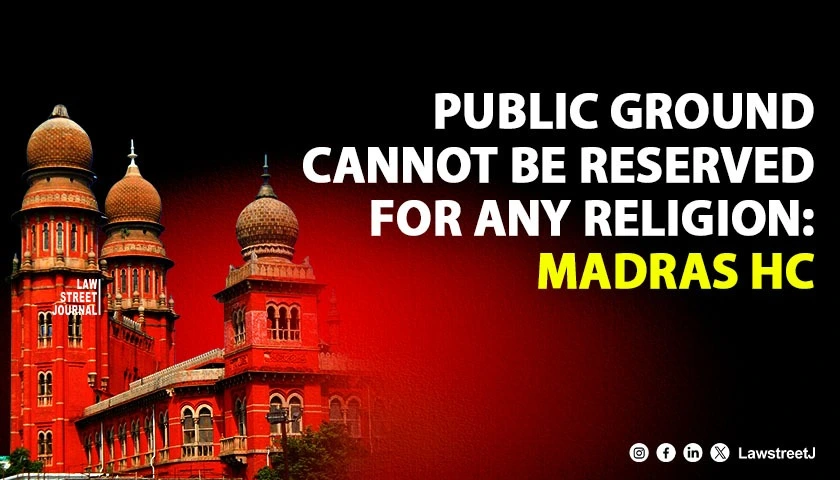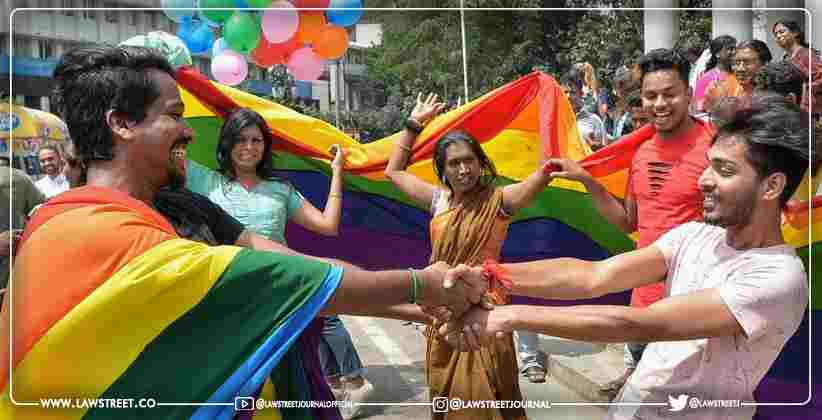Chennai: The Madurai Bench of the Madras High Court has strongly criticised a Tahsildar’s refusal to permit a Hindu resident to conduct Annadhanam (distribution of food) in connection with a temple Kumbabishekam, on the ground that the site had historically been used only by Christians.
The Court held that public grounds belong to the State and must be available for use by all communities irrespective of religion, and that citing possible law-and-order problems to deny fundamental rights is impermissible.
Justice G.R. Swaminathan delivered the judgment on October 31, 2025, while allowing W.P.(MD) No. 30834 of 2025 filed by K. Rajamani, a resident of N. Panchampatti Village, Dindigul District, challenging the Tahsildar’s order dated October 24, 2025, which rejected his request to organise Annadhanam for the Kaliyamman Temple Kumbabishekam on November 3, 2025. The Tahsildar instead allotted an alternative site—a public road—for the event.
The petitioner sought to conduct the Annadhanam at Survey No. 202/3, a common ground known as Sunkasavadi Ground near the temple. The Tahsildar denied permission citing the possibility of communal tension, since the ground had allegedly been used exclusively by the Christian community for over a century for Easter celebrations. The fourth respondent, representing the Christian community, opposed the petition, asserting that the ground had a “Pascha Stage” built 100 years ago and had been traditionally used for Christian events.
The Court, however, rejected these submissions. It noted that even in the counter-affidavit filed by the fourth respondent, it was admitted that the open space belonged to the panchayat, and the Special Government Pleader confirmed that the land in S. No. 202/3 was classified as grama natham (village common land) belonging to the Government. Justice Swaminathan referred to a 2021 Division Bench order in K. Rajasekar v. District Collector, Dindigul, which clarified that no construction could be made on the same land, reaffirming its public nature.
The Court held that when land belongs to the State, it must be available to all sections of society, and no community can claim exclusive use of a public ground. “A public ground should be available for the use of all communities or none,” Justice Swaminathan observed, adding, “I cannot accept the submission that while Christians can use the ground on Easter, Hindus cannot conduct Annadhanam in the very same place.”
Rejecting the State’s argument of potential law-and-order issues, the Court emphasised that such apprehensions cannot be used to suppress fundamental rights. Citing a 2025 Division Bench decision in W.A.(MD) No. 694 of 2020, the Court reiterated that rights under Articles 25 and 26 of the Constitution cannot be denied on mere apprehension of disturbance. Justice Swaminathan also referred to the 1926 Madras High Court judgment in Venkata Subbaya v. Muhammad Falauddin Khaji, where Justice Phillips held that authorities cannot abdicate responsibility by refusing protection to lawful activities under the pretext of avoiding riots.
Referring to earlier precedents, including Annamalai Ayee Chatram v. Authorised Officer, Thanjavur (1986 SCC OnLine Mad 191), the Court reiterated that Annadhanam is a form of Dharmam and an observance of religious character forming part of the right to freely practise religion under Article 25. “When it comes to upholding fundamental rights, it is the duty of the local administration to stand in aid of the same. The police should not choose the easy option of stifling these rights,” the Court remarked.
The Court expressed dismay over the administration’s approach, noting that the Hindu community in the village was significantly outnumbered by Christians, with around 2,500 Christian families and only 400 Hindu families. Justice Swaminathan observed that communal harmony requires mutual respect and participation in each other’s celebrations, lamenting the decline of such interfaith camaraderie.
Holding that the refusal order was unconstitutional and discriminatory, the Court quashed the Tahsildar’s order and permitted the petitioner to conduct Annadhanam on the requested ground, directing that the site be restored to its original condition after the event. The Superintendent of Police, Dindigul, was instructed to ensure peaceful conduct of the programme.
The writ petition was accordingly allowed, with no order as to costs.
Case Title: K. Rajamani v. Joint Commissioner, HR & CE Department & Ors.
Disclaimer: This content is produced and published by LawStreet Journal Media for informational purposes only and does not constitute legal advice. The views expressed are independent of any legal practice of the individuals involved.








![TN Medical Council declares change of gender identity of LGBTQIA+ as misconduct [Read Notification]](/secure/uploads/2022/12/lj_5268_5cebb05a-97fb-40fb-8045-25cdf8f4207a.jpg)
![Madras High Court Directs Tamil Nadu Government to Ensure Quota for Transgenders in Local Body Elections [Read Order]](/secure/uploads/2023/08/lj_2507_7a03d113-08b1-4670-b6fb-9058aee481d0.jpg)
![Anti Corruption sleuths acted like "puppets in The Muppet Show", HC notice to ex TN CM in disproportionate assets case [Read Order]](/secure/uploads/2023/09/lj_8675_7b37fc02-1b2d-4f4a-9816-3df20545b37e.jpg)






